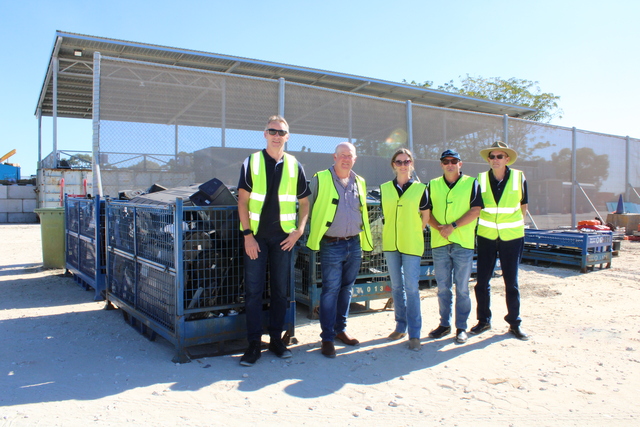The Good Oil by Rod Brown *
Do you believe in scientists’ claims about holes in the ozone layer and melting ice caps? Or are you at the other end of the scale, and believe that President Bush is right in rejecting the Kyoto convention, despite the US using 25 percent of the world’s fossil fuels?
The unfortunate part of the whole environmental debate – whether in relation to trees, CO2, salinity, fishing resources or whatever – is that the heart tends to rule the head and the opposing camps are so quickly into the trenches that a sensible outcome takes years of negotiation to achieve. Therefore it is good to see evidence of commonsense and interaction between environmental and economic development interests.
In Tropical North Queensland (TNQ to the locals) the fishing industry injects approximately $150 million into the region’s economy and employs around 1,600 people. It is a major contributor to Australia’s $1.4 billion annual seafood exports.
The fisheries in the region are the East Coast Trawl Fishery, Northern Prawn Fishery, Torres Strait Prawn Fishery, Estuarine and Inshore Fishery, Line and Crab Fisheries, Rock Lobster Fisheries and Aquaculture. The main export products are prawns, tuna, lobsters, crabs and fish and Cairns lays claim to the largest fishing fleet in Australia.
An array of environmental agendas are now unfolding in TNQ. Twenty years ago, the issues embedded in these agendas might have been resolved by a pool cue being embedded in someone’s head.
But in 2001 we have Ecofish. It is a non profit organisation, established to represent the seafood and marine industry, to ensure its long term survival and to maximise the economic benefits to the region.
The members are a mix of fishers, fish processors, wholesalers, retailers, chandleries, slipways, engineers, paint and fuel distributors, and other support services such as legal and financial. They operate along the lines of a cluster.
In most cases, clusters are formed to achieve economies of scale, acquire new technologies and enter new markets through greater industry collaboration. However, the principal motivational factor in the initial stages was the threat of government regulation to the ongoing viability of northern fisheries. As a result, much of the initial stages of the cluster focused on survival rather than addressing the conventional developmental issues.
The commercial fishing industry has had to adjust and respond to pressures from environmentalists, government and the recreational fishing sector. Over recent times the industry has faced restructuring in the Gulf of Carpentaria Inshore Gill Net Fishery, Northern Prawn Fishery and East Coast Trawl Fishery.
Ecofish Executive Officer, Darren Cleland, explained that due to the demand for environmental accountability, most in the fishing industry are voluntarily pursuing new practices.
Rather than rely on legislators to dictate the future of environmental management, the stakeholders are taking a proactive approach, for example, by establishing sustainable Environmental Management Systems (EMS) for their fishery. They claim that they are in a leading position to shape the environmental management of fisheries for the next century.
“We are grasping this chance now, and are working to establish EMSs to a level that has only been developed in a few fisheries across the globe,” he said.
Ecofish TNQ recognises that environmental certification is likely to become essential, and has therefore identified actions to put them on the front foot to ensure the long term survival of the industry.
Actions include the following.
- Raising the awareness and understanding of the importance of the industry.
- Improving their lobbying skills, presumably to keep up with the very effective environmental lobby.
- Ensuring the industry actively pursues world’s best ecologically sustainable fishing practices.
- Working with educational bodies to improve industry training opportunities and standards and to develop attractive career opportunities.
Interestingly, Ecofish members have actively pursued the development of environmental safeguards such as by-catch reduction devices and turtle exclusion devices, prior to legislation, and these are now mandatory features in trawl management plans for the region.
I am informed that they are ahead of most southern fisheries. Ecofish is also sponsoring a younger member in the Australian Fisheries Academy’s Leadership Program. It also offers work experience and training opportunities for young people interested in joining the industry.
The promotion of the industry to the general public is achieved through media liaison, school group industry visits, quarterly newsletters, promotional displays, fundraising events and community donations.
What is the moral of this story?
It appears that Ecofish has managed to position itself within the various environmental reviews and inquiries underway in the region. In doing so, it has increased the chances of getting sensible decisions from these processes, and improved the reconciliation of environmental and development objectives.
Most importantly, Ecofish members are setting themselves up as experts in the field, which means that their competitive advantage must increase as stricter environmental regulations inevitably strengthen in other countries in coming years.
Given that many Pacific Island communities are dependent on the health of their fisheries, Ecofish members should be in strong demand to assist with the transfer of their knowledge and experience.
* Rod Brown’s Canberra based consultancy group, Australian Project Developments Pty Ltd, specialises in industry/regional development and government liaison. For further information telephone (02) 6231 7261 or email apd@orac.net.au







